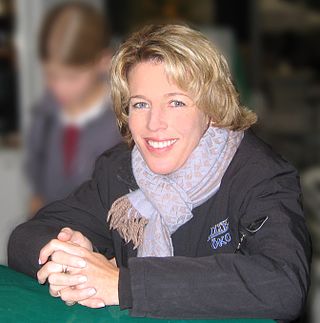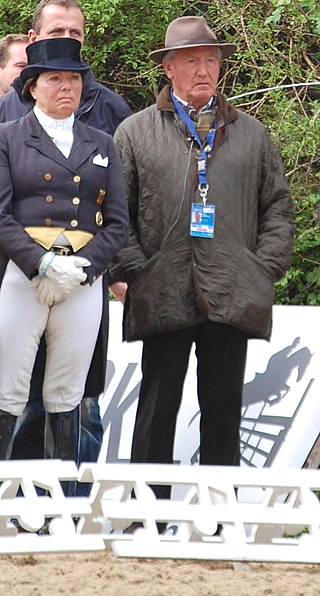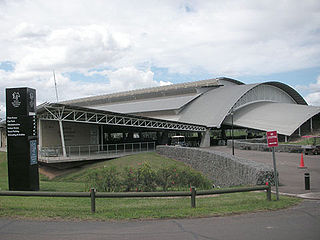
Germany competed at the 2004 Summer Olympics in Athens, Greece, from 13 to 29 August 2004. This was the nation's fourth consecutive appearance at the Summer Olympics after its reunification in 1990. The German Olympic Sports Confederation sent the nation's second largest delegation to the Games since its reunification. A total of 441 athletes, 250 men and 191 women, competed in 27 sports, and were nominated by DOSB at four occasions.

The individual show jumping event, part of the equestrian program at the 2004 Summer Olympics, was held from 22 to 27 August 2004 in the Olympic Equestrian Centre on the outskirts of Markopoulo in the Attica region of Greece. Like all other equestrian events, the jumping competition was mixed gender, with both male and female athletes competing in the same division. There were 77 competitors from 27 nations. Each nation could send up to 4 riders. Cian O'Connor of Ireland initially received the gold medal, but that medal was stripped from him due to doping. After his disqualification, the event was won by Rodrigo Pessoa of Brazil, the nation's first medal in individual jumping. Silver went to Chris Kappler of the United States, with bronze to Marco Kutscher of Germany.

Malin Birgitta Baryard-Johnsson is a Swedish equestrian, competing in show jumping. Baryard started to ride at the age of six and went on to be a very accomplished show jumper. She won a gold medal in the Swedish Championships at the age of just 14. She married Swedish TV presenter Henrik Johnsson in the summer of 2004, and made her TV-presenting debut in the autumn of 2004 on the SVT show Barbacka.
Petrus Josephus "Piet" Raijmakers is a former equestrian from the Netherlands.

Meredith Michaels-Beerbaum is an American-born German equestrian who competes at the international level in show jumping.

Ludger Beerbaum is an internationally successful German equestrian who competes in show jumping and has been ranked the No. 1 Show Jumper in the world by the FEI on multiple occasions. He is also a four-time Olympic Gold medalist team and individual.
The FEI European Show Jumping Championships is the European Championship for the equestrian discipline of show jumping. First held in 1957 in Rotterdam, and on an annual basis, it is held every two years, in the years between Olympic Games and World Equestrian Games.

The individual show jumping at the 2008 Summer Olympics took place between 15 and 21 August, at the Hong Kong Sports Institute. Like all other equestrian events, the jumping competition was mixed gender, with both male and female athletes competing in the same division. There were 77 competitors from 29 nations. The event was won by Eric Lamaze of Canada, the nation's first victory in individual jumping and first medal of any color in the event since 1976. Silver went to Rolf-Göran Bengtsson of Sweden, that nation's first medal in individual jumping since 1932. American Beezie Madden, who had led through the three qualifying rounds in 2004 before a bad first final round put her in 30th overall in Athens, took the bronze medal in Beijing.

Ulrich Kirchhoff is a German and Ukrainian show jumping rider, Olympic champion from 1996.

Franke Sloothaak is a German show jumping champion, Olympic champion from 1988 and 1996.

Marcus Ehning is a German show jumping champion, Olympic champion from 2000. He is married to Nadia Ehning. He won the Longines Global Champions Tour of Vienna Grand Prix on Plot Blue in September 2014.

Otto Becker is a former German show jumping champion, Olympic champion from 2000. Since January 2009 he is the coach of the German show jumping team.

Klaus Balkenhol is a German equestrian and Olympic champion. He won a gold medal in team dressage at the 1992 Summer Olympics in Barcelona with the team from Germany. Balkenhol is the author of several dressage books. He is an avid member of Xenophen, and like Philippe Karl petitions against the use of rollkur. Balkenhol's earlier riding career consisted of being a mounted policeman. He was also the coach of the U.S. Olympic team. He also received a gold medal with the German team in 1996. At present Balkenhol is the trainer of Olympic equestrian Laura Bechtolsheimer.
Martin Schaudt is a German equestrian and Olympic champion. He won a gold medal in team dressage at the 1996 Summer Olympics in Atlanta with the team from Germany.

Jeroen Dubbeldam is a Dutch show jumping champion.

Germany competed at the 2012 Summer Olympics in London, from 27 July to 12 August 2012. This was the nation's sixth consecutive appearance at the Summer Olympics after its reunification in 1990. The German Olympic Sports Confederation sent the nation's smallest delegation to the Games since its reunification. A total of 392 athletes, 218 men and 174 women, competed in 23 sports, and were nominated by DOSB on four occasions.

The individual show jumping event, part of the equestrian program at the 2000 Summer Olympics, was held from 25 September to 1 October 2000 at the Sydney International Equestrian Centre 45 miles outside of Sydney, Australia. Like all other equestrian events, the jumping competition was mixed gender, with both male and female athletes competing in the same division. There were 74 competitors from 28 nations. Each nation could have up to 4 riders. The event resulted in a three-way tie for first and a medal jump-off. Dutch riders Jeroen Dubbeldam and Albert Voorn finished first and second in that jump-off, earning the Netherlands' first gold medal and second silver medal in individual jumping. Khaled Al Eid earned Saudi Arabia's first medal in the event with his bronze, finishing third in the jump-off.

The individual show jumping in equestrian at the Rio 2016 Summer Olympics was held from 14–19 August. Like all other equestrian events, the jumping competition was mixed gender, with both male and female athletes competing in the same division. There were 74 competitors from 27 nations. The event was won by Nick Skelton of Great Britain, the nation's first victory in individual jumping and first medal of any color since making the podium four consecutive Games from 1960 to 1972. Silver went to Peder Fredricson of Sweden. Eric Lamaze of Canada took bronze, becoming the first person since 1968 and sixth overall to win multiple medals.

The individual show jumping event, part of the equestrian program at the 1996 Summer Olympics, was held from 29 July to 1 August 1996 at the Georgia International Horse Park, in Conyers, Georgia. Like all other equestrian events, the jumping competition was mixed gender, with both male and female athletes competing in the same division. There were 82 competitors from 24 nations. Each nation could have up to 4 riders. The event was won by Ulrich Kirchhoff of Germany, the nation's second consecutive victory in the individual jumping. It was the fourth consecutive Games at which Germany competed that the nation reached the podium in the event—gold in 1936 and bronze in 1952, before gold again in 1992 and 1996. The silver medal went to Wilhelm Melliger of Switzerland and the bronze to Alexandra Ledermann of France, the two of whom came out on top of a seven-way jump-off for second place.

The individual show jumping at the 1992 Summer Olympics took place between 4 and 9 August at the Real Club de Polo de Barcelona. The event was open to men and women. There were 87 competitors from 30 nations. Each nation could have up to 4 riders. The event was won by Ludger Beerbaum of Germany, the nation's second victory in individual jumping. It was the third consecutive Games at which Germany competed that the nation reached the podium in the event—gold in 1936 and bronze in 1952. Piet Raymakers earned the Netherlands' first medal in the event with his silver. The United States reached the podium for the third consecutive Games with Norman Dello Joio's bronze.



















